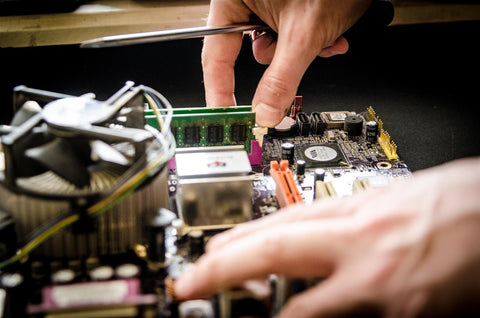Lately, we've talked a lot about why we love the Raspberry Pi, but we forgot one crucial reason why we think this is an awesome tool.
The main reason we love the Raspberry Pi is because it’s an affordable way to learn – learn to code, learn to use Linux, learn to troubleshoot problems, learn to build a network router, learn computer science basics, learn real-world skills you’ll actually use as a cybersecurity professional.
No Degree Required
You may think that to land a six-figure job, you have to drop six figures on a degree in computer science or engineering or some other technical field.
Cybersecurity is a brand new industry and education programs dedicated to learning it are scarce. Those that do exist are relegated to top-tier Ivy League and private universities with highly competitive rosters and hefty price tags.

We don't want to discredit the value of a college education – but we want to
encourage you to explore your options before committing to an expensive degree.
I’m here to tell you that you don’t need a fancy degree from a fancy college to get into this industry right now. How do I know? Because I don’t have a degree in cybersecurity or engineering or computer science, but I still got the job. (In case you were wondering, I have bachelor degrees in Communications & Theater and Business that I earned at a small public college.)
Many of my students are also getting cybersecurity jobs that will pay off big in the long run by simply following my advice.
But those students aren’t you, and perhaps you still have your doubts. How could you, with no technical education or work experience, build a career that will change your life and the lives of your family and loved ones?
George Did It…
Let me tell you about George (that's not his real name because we're a cybersecurity company, and we want to keep his identity secure).
George is a friend of mine. We started out as professional colleagues building our cybersecurity careers together but quickly evolved into close friends. Because that’s just who George is – he’s a friendly guy!
George was born in another country. He moved to the U.S. with his family as a kid, and he and his family worked hard to gain their citizenship.
But in school, George was admittedly lazy. As is the case with many teenagers, he didn't care about what he was learning, and he didn't really see the point. As a result, he didn't do the work, his grades fell, and eventually he ended up dropping out.
Without a diploma, George had to rely on his wits and his people skills. He found a job working in retail, which fit well with his outgoing personality.
Outside of work, George enjoyed playing PC video games. He started getting interested in the hardware he was using and how that affected the performance of his games.
He saved up to build himself a gaming computer. It took a lot of research, from selecting parts to assembling them in the right configuration. But what he built was far better than anything he could have bought pre-built off the shelves. Researching, designing and building high-end gaming machines became his new hobby.
And he got a lot of satisfaction building the computer himself, with his own skills. Even though he was existing paycheck to paycheck, he scrimped together every cent he could to get the exact parts he wanted. To him, building the perfect machine was worth every penny.
 George's hobby of building computers ultimately led him to a successful career in cybersecurity.
George's hobby of building computers ultimately led him to a successful career in cybersecurity.
At work, George befriended his manager, Rob, who was a student about to graduate from university. After he finished school, Rob quit his job managing the store and entered career land.
As he watched Rob have success in his new career, George began to wonder what was next. He didn’t want to work in retail forever. He began wondering if he could translate his new hobby – building personal gaming computers – into a profession.
He brushed up his resume and began looking for IT jobs. Why not? He had nothing to lose. He didn’t get the first job he applied to. Or the second. But he kept at it. Finally, he got called into an interview with a teeny tiny network engineering firm.
This was his chance, and he seized it. He delighted the interviewer with his personality and blew them away with his knowledge of computers and his passion for creating new technology. He got the job, beating out candidates with years of network engineering experience packed onto resumes pages long.
He loved his new job, and his managers thought highly of his work ethic and his willingness to learn. He got several promotions and was soon entrusted to oversee the launch of a brand new security technology, which was successfully distributed across the country.
Meanwhile, Rob had taken his degree and leveraged it into a career at a large cybersecurity company. He followed George’s success with interest, and as soon as he got the chance, he recommended George for a job with his company. It was a hefty raise, a better title and more room for growth in George’s career. He jumped at the opportunity.
And the rest is history. Now, George is making a six-figure income – with the flexibility to work remotely – and has a highly successful cybersecurity career that he built around his hobby.
He never did get his high school diploma, nor does he have a college degree. He does have a laundry list of certs (many paid for by his employers), the unstoppable power of sheer motivation, great people skills and lots of wit.
You Can Do It, Too
George’s story may sound too good to be true, but when it comes to tech hobbyists and gamers, it’s really not all that uncommon.
His story could be yours.
Even if you’re not a gamer or a tech tinkerer, if you can navigate the internet, you can learn the skills to get started building your career right now.
We created the Pi’d Hacker Starter Course because every high-end career starts with building the right skills for the job. The Raspberry Pi is not only a tool used by professionals, it’s also an affordable platform on which to learn.
If cybersecurity is the Wild West of the internet, then the Pi’d Hacker Starter Course with Raspberry Pi is your lasso – an absolutely essential tool that any good cowboy wouldn’t be caught dead without.
In addition to learning fundamental skills in this course, we provide real-world simulations so you can see how the skills we teach are applied to the workplace. We’ll present a realistic cybersecurity scenario and assign you a cybersecurity role – such as a malware analyst, a SOC architect or a penetration tester. Once you have your role, we’ll work as a team to address the scenario and neutralize the threat.
You can also use your Raspberry Pi to prep for cybersecurity certifications, which require knowledge of Linux and basic computer science, which we’ll cover in Week 1 of the Pi’d Hacker Cybersecurity Course.
Start Your New Career Right Now
When you’re ready to build the skills you need to start a cybersecurity career, check out the Pi’d Hacker Experience Prerequisites, a free cybersecurity career workshop.

